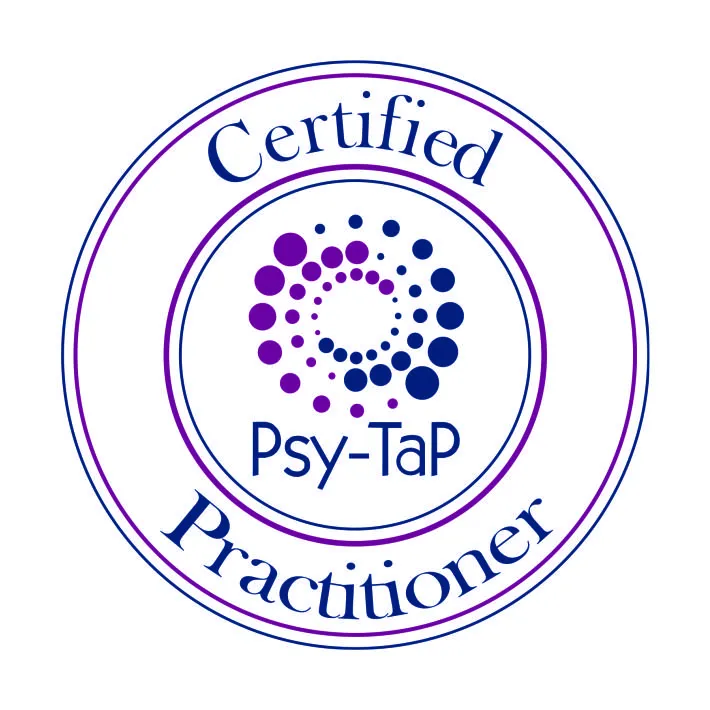Anxiety FAQs
Nick Warburton - Anxiety Specialist
Easy - Comfortable - Safe
Anxiety - Frequently Asked Questions
Anxiety FAQs answered
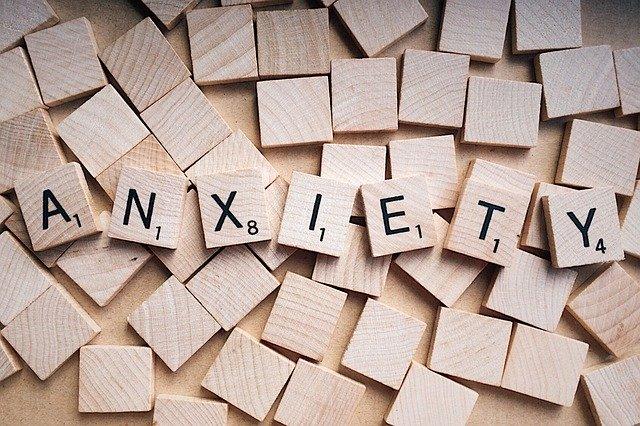
Do I have anxiety or trauma?
Anxiety, worry and trauma have all increased, particularly due to the past few years and there are plenty of official statistics to support these observations. It's been a tough time for many and with the fear of the unknown, the things that have happened this naturally creates anxiety. It may feel that anxiety and distress only applies to the person who has it. However, anxiety has a ripple effect which then projects out to others (unintentionally) and this can be seen and felt by family, colleagues and friends too.
It's important for everyone to understand that there are solutions for anxiety and please do not despair. Assistance is always available through many different ways. Nick Warburton has encountered many different situations with his clients and will understand and be sympathetic to your situation too. This, along with his certificated practitioner and trainer qualifications, his experience and specialism in anxiety all enable him to answer your frequently asked questions about anxiety and worry. Nick always wants his clients to feel comfortable and safe working with him.
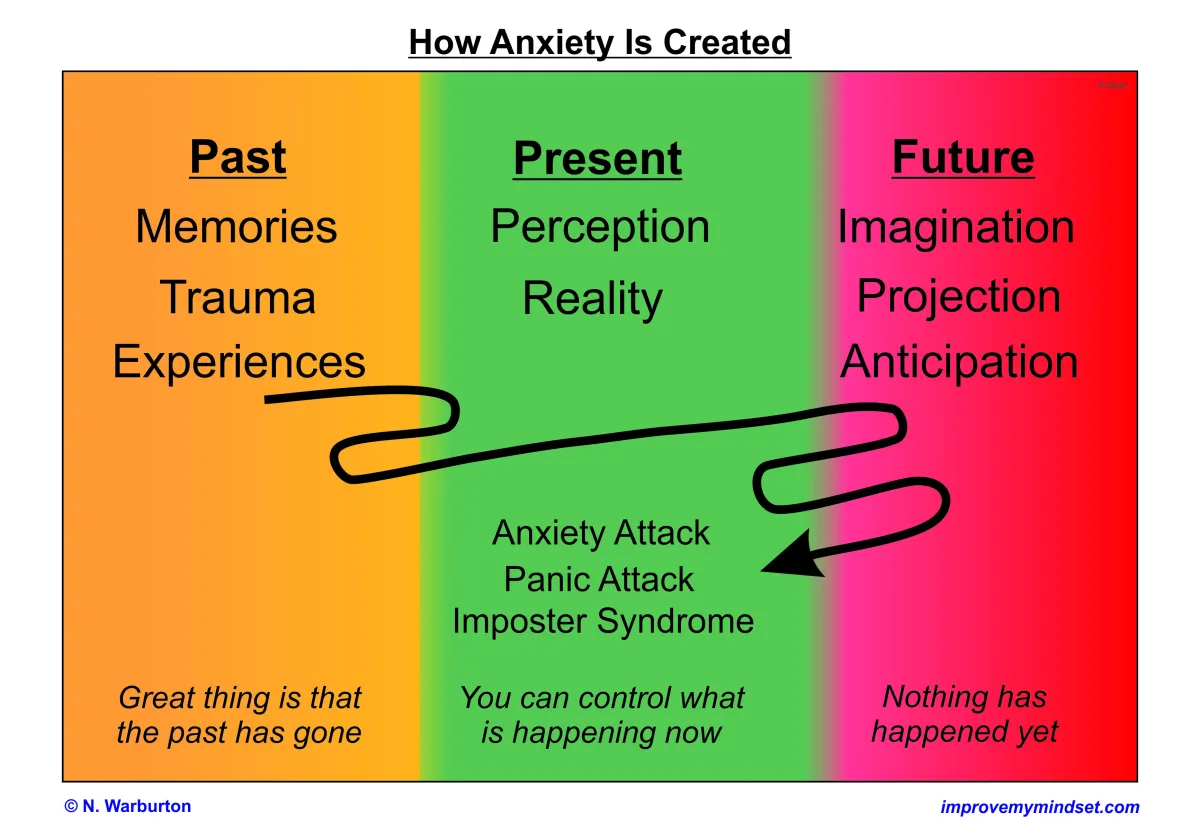
Anxiety can stem from trauma
Below are some of the commonly asked questions about anxiety.
Anxiety FAQs
Why anxiety happens?
Anxiety happens because it is a form of safety mechanism. It's your brain trying to protect you so that you survive. That's a good thing! However, sometimes the brain's sensitivity (Let's call it your radar) can be set too high and sensitive due to a previous event that wasn't processed in the usual way. The original (root) event was likely to have created some form of trauma. The brain then decides that to keep you safe from further potential trauma, it must keep you in a state of 'Red Alert'. The radar then constantly watches for something it considers as a potential threat. The more sensitive the radar becomes, which often happens the longer you have it, the smaller the potential trigger and the bigger the response. It is the anticipation that something may happen to feel unsafe.
Where anxiety comes from? Anxiety stems from part of the brain called the Amygdala. This is the part that triggers that well-known phrase, 'Fight or flight', the protection device to ensure you survive.
Removing anxiety via a treatment should be about resetting your radar and altering the neuro-pathways so that the event and the emotion are separated. It's about separating the emotions from the event, so that you don't respond in distress. Below are the most commonly asked questions about anxiety.

What anxiety looks like?
Anxiety can take many forms. Sometimes it can be obvious, yet it can be within someone and not displayed. Anxiety can look like a person being agitated with shallow breathing that may be increased in rate. They can also become reserved as they try to hide their anxiety or emotions, avoiding any interaction. There may be a trigger that causes them to suddenly become agitated or emotional while they display the 'fight or flight' response.
Anxiety can cause a person to look overwhelmed, sweating profusely, trembling, pale complexion, light-headed and nauseous with dilated pupils and yet some try very hard to hide it.
Other symptoms can be a change in appetite, self-harming or an increase in OCD (Obsessive Compulsion Disorder). Sleep can be affected as they can over-think situations. This lack of sleep can lead to tiredness and lethargy, so an indicator may be regular yawning and lower than normal energy levels.
Use the anxiety checklist that's available to download on the Resources page to assist you recognising potential anxiety.
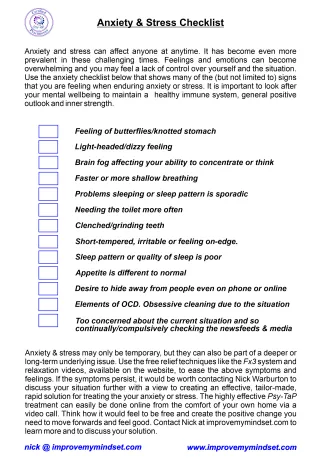
What anxiety feels like?
Anxiety is a reaction to a potential event that is perceived as traumatic. This means that you are on high alert and have stress chemicals being released by the brain in preparation of having to 'fight or flight'. The body has a Sympathetic Nervous System which instructs various parts of your body to prepare to do what may be needed to ensure safety. You can see this in the diagram which can be downloaded from the Resources page.
Your breathing may become shallow and more rapid. Pulse rate increase as the stress chemical Cortisol and Adrenaline are released. Your mouth may become dry and muscles feel tense. Your pupils will dilate and your stomach may feel either knotted or full or butterflies. This may lead to a feeling of nausea.
Digestion is inhibited, so you can lose your appetite. Naturally a reduced intake of food and poor diet can cause lower energy, so you may feel tired or lethargic and yet can't sleep. There may be an urge for sugary foods to provide a quick energy boost.
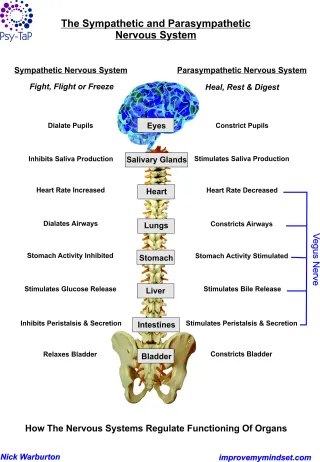
Will anxiety go away?
Yes and No, but it depends. Everyone is different and unique, so there are a few factors on whether and how easily the anxiety goes away. It depends on the nature of the anxiety, the severity of the anxiety/trauma and also what is required to enable you to overcome the anxiety. If it is short-term and mild anxiety, then there is the potential for the anxiety to dissipate by itself. How long this takes will vary and is dependant on various factors..
If the anxiety or trauma is deep rooted, then the likelihood of it going away is highly unlikely. Some people live with anxiety for years or even decades. If there is no intervention, then that trauma can stay throughout life and can cause other issues or be manifested as Eating disorders, change in temperament or change in personality. This is known as the refractory period (see diagram). When anxiety takes over your life, it can feel like there's no way out and that you no longer feel like you. Just because someone has anxiety and trauma, doesn't mean they have to live with it. There are solutions!
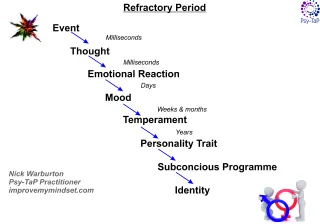
Which anxiety disorder do I have?
A common question is, what anxiety do I have? There are several types of anxiety disorder. Bear in mind there is a difference between anxiety, fear and trauma. They have different characteristics and so it is important to identify what you have when working with a specialist so that you have the most effective solution/treatment.
The most common are:
General Anxiety Disorder.
Separation Anxiety Disorder
Social Anxiety Disorder
Anxiety, no matter what label it is given all have a similar effect on the body. What triggers the Anxiety is personal to the individual. It may be a common trigger such as the Social Anxiety Disorder or the Separation Anxiety Disorder, however, all anxieties are triggered from a root cause or event. If you watch the video The Trauma Tree or look at the diagram, you will see that Anxiety is a branch of the Trauma Tree, hence why it is important that the root cause is addressed, not just the anxiety. Some people can have more than just the anxiety as they may have and display OCD as this is a form of control in a world that is perceived as out of control.
Every person's Trauma Tree is different and the quantity and type of branches can vary. Now you see why it is important to be labelled. Remember that your brain believes it is doing it's best to protect you. Anxiety is the brain working too hard to protect you and just needs a reset. It has become over-sensitive and your safety radar has been set to 'Maximum'.
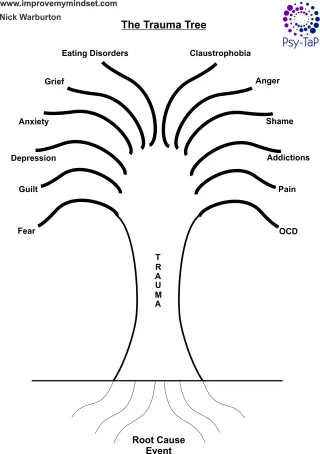
Why is anxiety worse in the morning?
Anxiety has the potential for to be worse in the morning for a simple reason; we don't know what is going to happen in the day ahead. Your subconscious will be asking questions like:
Will I be OK?
What will happen today?
Will anyone notice my anxiety?
What will happen if they do see my anxiety?
How bad is my anxiety going to be?
Will I embarrass myself?
Will I be safe?
Remember that anxiety is anticipatory, therefore the unknown and future can be seen as a threat and unsafe. When the radar is set to highly sensitive, these questions show there is a potential threat to safety or being embarrassed and so becomes a vicious circle. At the end of the day, you will be in the safety of being at home and away from people or triggers that you probably avoided and all the issues from the questions, so there is a form of relief.

Can anxiety cause chest pain?
Anxiety can cause chest pains which can vary in severity. This is a physical symptom as opposed to a mental or emotional symptom. However, it is important to be aware if the pain is being caused by another factor. Any chest pain should be checked by a Doctor/GP in case it is a symptom of something else.
Chest pain can be from anxiety progressing into a panic attack. The chest can become tight. The pain can appear and disappear quite quickly. It can feel like a sharp, stabbing pain. The pain can last for about 10 mins, although other symptoms may last longer.
Extended lengths of anxiety can lead to physical illness and cardiac issues. When in distress, the body releases Cortisol, which if released for sustained periods can compromise the immune system and potential cause physical illness.
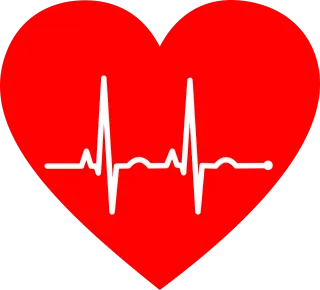
Can anxiety cause high blood pressure?
Anxiety can cause high blood pressure and cardiac issues. This will depend on the nature and severity of the anxiety and their state of health. Anxiety can trigger other health issues indirectly rather than the anxiety itself causing it, eg a poor diet or lack of self-care.
If you feel that you may be experiencing high blood pressure, cardiac issues or any other symptoms of concern, see your Doctor/GP.
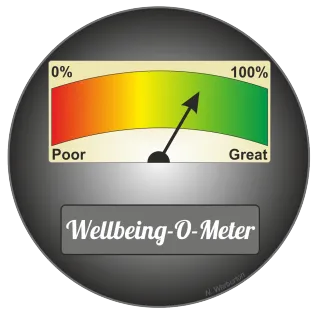
Are anxiety tics a thing?
There is potential to experience anxiety tics. These can be either physical tics, verbal tics or both. Anxiety tics may occur under levels of stress, tiredness or extremes of emotion.
Tics can be genetic and may appear at some point in life and coincide with anxiety, rather than being caused by anxiety.
If the tic is happening when anxious or feeling under pressure/distress, it is possible to overcome trauma and anxiety with the right support or practitioner to enable a calmer and more relaxed life which will reduce the trigger of a tic.

Stop Anxiety - Video - Nick Warburton
Understanding Anxiety
If you have read the Anxiety FAQs you should have some more idea and understanding about what you are experiencing and what can be done to alleviate the situation. There are so many other influences including the relentless media and social media that can create anxious or traumatic responses. It can be an information overload in a time when you just want some normality. Is it any wonder anxiety, worry and trauma are on the increase?
Your health can also be affected due to the amount of Cortisol (the bad, stress-related chemical) your body releases when feeling anxious or when worrying. This stress chemical can lead to other health issues and can create the environment for the susceptibility to illness and disease. Your sleep is likely to be affected too, so you will become more tired and this then makes you more susceptible to being irritable/emotional, making poor decisions and more anxious. This can often lead to 'Brain-fog' which slows your thinking or can create confusion and the ability to think straight.
Anxiety Relief
There are many different methods to treat anxiety, some natural, some taught in systems like CBT or Counselling that offer 'coping' techniques. However, in my opinion, 'coping' is not enough and not the right solution. Why should you have to just 'cope'?! I see many people or 'experts' talking about 'Coping Mechanisms'. To me, that isn't enough for you. I'm here to enable you to be supported, rapidly and effectively and stop the downward spiral and associated negative feelings. There are various other methods available in the therapies world to 'cope' with the your situation. Often prescribed medication has been issued or perhaps numerous CBT or counselling sessions. However, I firmly believe these are not ideal for a person who is still suffering physically and mentally. Medication isn't always the answer, especially long-term, so I look to create a solution of releasing the trauma so there's no need or reason to 'cope'. Then a Doctor or GP may consider that prescribed medication as no longer necessary. The body contains its own amazing chemistry set, so let's access and utilise those in the best way while altering and improving your neuro-pathways. You are an amazing human being if and when you allow yourself to be. Let's enable your subconscious and unconscious mind to recognise that too.
Counselling or CBT (Cognitive Behavioural Therapy) are 'Talking Therapies' for 'coping' with anxiety, stress and panic attacks, in my personal opinion, does not remove the root cause from where it is attached in the brain (the right hemisphere). With those methods, you may end up having numerous sessions with them where they are made to repeatedly re-live the traumatic 'event'. This technique frustrates and upsets me. Why would you want to relive that event over and over again in a counselling session when that event is what's causing the suffering and distress in the first place?! Talking therapies have limited effectiveness and limited longevity, as they simply don't shift or release the trauma that is residing in the right hemisphere of the brain. I'm sure you will agree that we want your trauma, anxiety and panic attacks gone as soon as possible! You've been through more than enough already with your trauma and past situation. It's now time for you to feel free.
Let's work together to make a difference for you.
Being in control of your thoughts and emotions enables you to focus on the rest of your life. The fact that you are at my website and taking the time to read this information means that you actively want positive changes for your life. The great thing is that now you are here, you have already started that decision process, so let's work together now to rapidly remove your anxiety and trauma, enable you to grow and develop without distress or anxiety and lead your life as it should be; trauma and anxiety free.
We can rapidly and effectively remove their trauma and alter the thought loops or neuro-pathways in their brain. Have a look at my information videos and info sheets on the Resources page and learn more about how we can achieve this and stop anxiety and then you can contact me to make a start.
I strive to improve my client's life in our session. I trained to be a Certificated Practitioner of Psy-TaP, a wonderful, rapid and elegant method of treatment, which means I can rapidly eradicate or alleviate your anxiety, stress or trauma issues, often in just one session. I have worked with adults and children who have previously suffered anxiety and panic attacks with great success. Check out the testimonials and let's have a chat about creating a tailored solution for you.
I can fully understand and sympathise with people's personal issues around these distressing barriers. Therefore, I'm able to tailor-make, what I feel, is the best possible session to address your situation and needs. I can work with you via video call to rapidly release your distress, fears, anxiety or other traumatic issues and then create a new confidence in you. Would you like that to happen for you?
Just suppose that you no longer had the issue...
Take a moment now to answer this: How would you feel to be free of your anxiety or worry? What would you now be able to achieve? How would it positively change your life?
We can work together to make these positive changes happen. I can work with children, teenagers and adults online via video call (from the comfort of your own home), as it really doesn't matter where you are in the world. As I tell my clients, "There's always a way".
I love seeing the rapid and positive change in clients when we work together and your case may be no exception. The key factor is to remove the root cause of your anxiety. Watch my information video about 'The Trauma Tree', below and it should then make more sense as to what is happening to you, how your emotions are being driven and why what I do when working with you in my session is so very rapid and effective.
The Trauma Tree Video
What's involved in working with me?
Once we have booked the session, for via video call, we will work together to remove the trauma and root cause. We can often be done in just one session of about 90 mins, although I'm not watching the clock. In my session you will understand what happens in the mind to cause the feelings you have. We will do the appropriate treatment process and then I will teach you how to maintain a great life and a positive mindset with your bespoke, ongoing neuro-health regime of brain exercises. These only take about 5 minutes in your day, yet create great mental wellbeing and resilience for now and the future. I create a long-term solution for you, so that the anxiety stays gone!
Psy-TaP is a highly effective and rapid method of treatment and I'm very proud to be a Certificated Practitioner and a qualified Trauma Release Trainer. Psy-TaP is not just another hypnotherapy, CBT or counselling method. It's about rapidly removing the trauma (the root cause), separating the emotions from the event and banishing the heightened defensive responses such as fears, anxiety and panic attacks. As you'll probably now be aware, I am very passionate about my work and love to see people overcome their psychological barriers. I get to be the first person to see their smiling face after the treatment session (a perk of the job for me!) and I love that. It can be quite a special moment for us both!
Payment for treatment is safe and secure via BACS transfer or PayPal. I offer a premium service and I'm confident you will see the value in being able to be back in control of your thoughts, your emotions and to feel calm again. How much have you already spent in time and money on books, treatments, counselling, subscriptions and supplements to try to achieve to stop anxiety and have a low-stress or trauma-free life and yet still couldn't find the solution? How many sessions have you done per week, per month and still no further forward? How much value is there in you no longer having the trauma or anxiety anymore once you've worked with me?
The benefits of working with me are that the treatment is rapid, effective and they will feel an improvement the same day. You will feel lighter as the weight of the issue/trauma is taken away and off your shoulders. By all means look at any alternative therapy and treatments out there, however, may I suggest you ask/check how long their course of treatment takes, the waiting time, their proven effectiveness and is there any supporting evidence? I am happy and able to support my methods with scientific and factual evidence. Have a look at the wonderful feedback that I'm proud and honoured to have been given by my previous clients on my Testimonials page.
What's the next step?
Please feel free to get in contact, either by email or phone. There is the option to book a free 20-minute Discovery call with me. We can discuss, in confidence, the best solution for you and then potentially book a suitable date and time for your session. Having the versatility of your session via video call (such as Zoom) enables the session to fit in with you, no matter where you are in the world, so that you feel that it is easy, comfortable and safe.
I look forward to hearing from you. Let's take the next step... Click the 'Contact Nick' button, below and let's release your anxiety, trauma and barriers.
N. Warburton ©2025
All rights reserved
